|
Printables |
PowerPoints |
Online exercises |
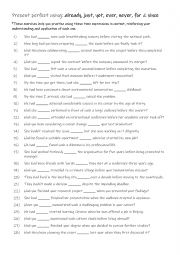
|
B1-B2 Present perfect using already, just, yet, ever, never, for & since
Mastering these adverbs helps students create more natural and fluid sentences, as they are commonly used in everyday English.
They enable students to participate more confidently in conversations about past experiences and ongoing activities. Answers on page 2
Level: intermediate
Age: 12-100
Type:
Downloads: 102
|
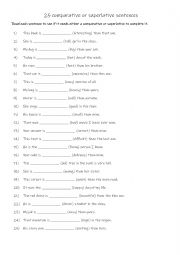
|
Comparative or superlative sentence practise 1 A
Students read each sentence to see if it needs either a comparative or superlative to complete it. Answers on page 2. In worksheet 1 B there is a generic speaking reinforcement activity using 25 of the base form adjectives in this worksheet.
Level: elementary
Age: 9-100
Type: worksheet
Downloads: 128
|
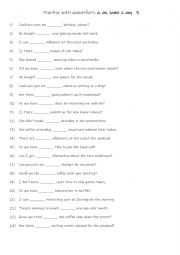
|
A1-A2 Practise with quantifiers a , an , some & any 5
Mastering these basics is essential for both everyday communication and more advanced language use, as these quantifiers are frequently used in real-life scenarios like offering, requesting, or describing items. First, students need to familiarise themselves with 4 quantifiers and check their meaning and use. Then they read the sentences to see whi...
Level: elementary
Age: 7-100
Type:
Downloads: 110
|
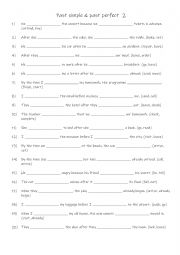
|
A2-B1 Past simple & past perfect 2
Learning the past simple and past perfect tenses is crucial for students as it helps them communicate clearly about past events, showing when actions occurred and how they relate to one another in time. Mastering these tenses improves storytelling, writing, and speaking, enabling students to convey events in a logical and nuanced way. Additionally,...
Level: elementary
Age: 9-100
Type:
Downloads: 114
|
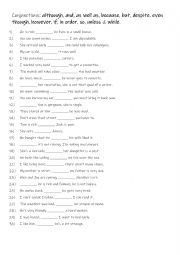
|
B1-B2 Conjunctions although, and, as well as, because, but, despite, even though, however, if, in order, so, unless & while.
Conjunctions help connect ideas, making your speech and writing clearer and more coherent. They enable you to present complex thoughts and relationships between different parts of a sentence or between sentences. Overall, mastering conjunctions enhances your ability to communicate effectively, whether in writing or speaking, and helps you better un...
Level: intermediate
Age: 10-100
Type:
Downloads: 110
|
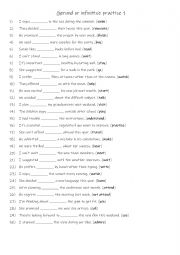
|
A2+-B1 Gerund or infinitive practise 1
Learning the difference between gerunds and infinitives is essential for achieving accuracy and fluency in English. Gerunds (verbs ending in -ing, like "swimming") and infinitives (the base form with "to," like "to swim") often have specific rules or conventions that dictate their use, which can change the meaning of a sentence. For example, "I sto...
Level: intermediate
Age: 8-100
Type:
Downloads: 114
|
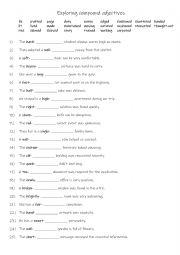
|
B1-B2 Exploring compound adjectives 1 (1)
Students read the sentences and complete the gap-fill with one of the adjectives in bold. Answers on page 2.
Level: intermediate
Age: 12-100
Type:
Downloads: 112
|
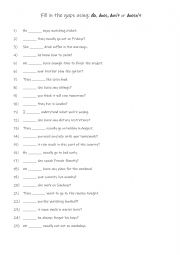
|
Fill in the gaps using: do, does, don�t or doesn�t
Students read and complete the sentences / questions using the correct form of auxiliary verb do. Answers are on page 2
Level: elementary
Age: 10-100
Type:
Downloads: 128
|
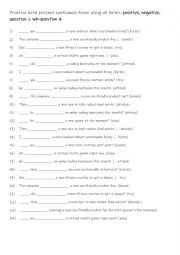
|
A1-A1+ Practise with present continuous tense using all forms positive, negative, question & wh-question 4
Each form is used 6 times! Answers on page 2.
Level: elementary
Age: 7-100
Type:
Downloads: 151
|
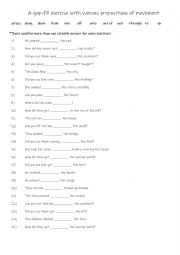
|
A2-B1 A gap-fill exercise with 12 prepositions of movement
Students familiarise themselves with the 12 prepositions of movement, then they read the sentences to see which prepositions is needed to complete the sentences. Answers on page 2.
Level: elementary
Age: 8-100
Type:
Downloads: 121
|
|
|
|
|












